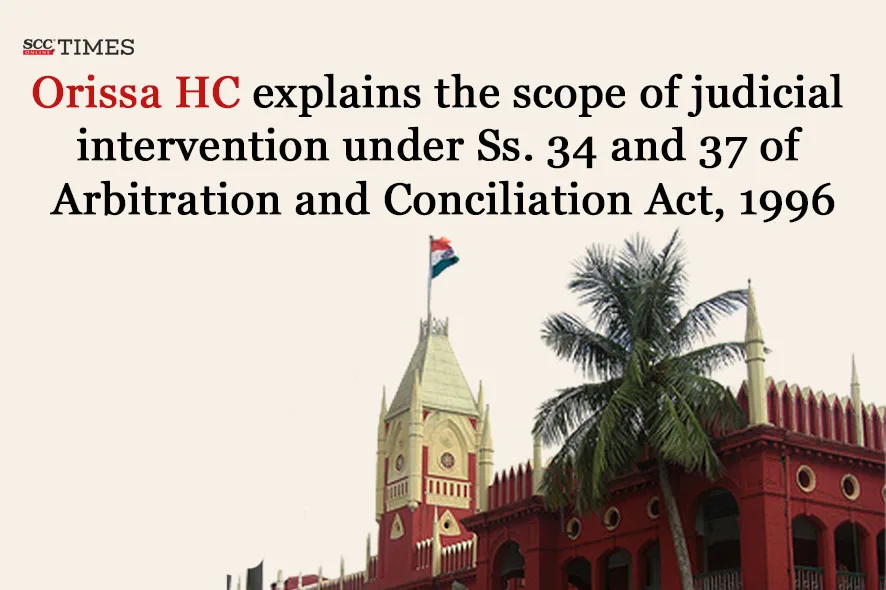Orissa High Court: The present appeal was filed by the Appellant-Contractor under Section 37 of the Arbitration and Conciliation Act, 1996 (the ‘1996 Act’) challenging the partial modification of an award by the District Judge, who had reduced one claim and set aside two others for lack of evidence. The State also filed a cross-appeal. A Single Judge Bench of Dr. S.K. Panigrahi, J., dismissed both appeals, holding that the lower court’s interference was limited to portions of the award that suffered from patent illegality due to lack of evidentiary support. The Court concluded that such targeted intervention was within the permissible scope of judicial review under Section 34 of the 1996 Act and affirmed the modified award.
Background:
The contract was awarded to the appellant under World Bank-assisted Package No. RGJM-II for repair and reconstruction of cyclone-damaged roads in Ganjam District from RD 0.000 km to 16.300 km (Dhunkapada—Kendubadi—Mandara— Nachunibadi). The agreement valued at Rs 2,17,38,992, was executed on 3-12-2002 with original completion period ending on 2-3-2004. Due to delays in site demarcation, borrow area identification, and water supply, the contractor sought extension until 31-12-2004. Though internally recommended up to 2-9-2004, the extension was never formally communicated. Instead, the contract was retrospectively terminated with effect from 2-9-2004, via letter dated 7-2-2005. The appellant challenged this termination on grounds that final measurements were not taken in his presence and that the 7th RA bill was wrongly treated as final, despite ongoing work beyond December 2004.
Pursuant to invocation of arbitration, a Sole Arbitrator was appointed by this Court under Section 11 of the 1996 Act. The appellant submitted 16 claims, and the State filed a counterclaim of Rs 14,78,595 alleging overpayments. The Arbitrator passed an award dated 31-1-2010, granting Rs 1,48,60,262 under various heads. The award held that the termination was illegal, and thus there was no final bill in compliance with OPWD Code. The Arbitrator partly allowed 11 claims and rejected the counterclaim.
The State challenged that award under Section 34 of the 1996 Act, on grounds of arbitrariness, excessive computation, and absence of contractual provisions for certain heads. The District Judge partly allowed the challenge, reducing Claim 1 to Rs 38,65,619 and setting aside Claims 4 and 6, while upholding rest of the award. The appellant preferred an appeal against this partial setting aside. As a result the State cross appealed.
The certified copy of the judgment was received on 1-12-2015 and the appeal was filed on 29-2-2016 after a delay of 36 days, which was sought to be condoned as procedural.
The appellant alleged that the District Judge acted in clear excess of jurisdiction under Section 34 of the 1996 by venturing into the merits of the disputes and re-evaluating evidence while setting aside Claims 4 and 6 of the awards. It was argued that the reduction of Claim 1 was not supported by any findings that the Arbitrator’s view was untenable. With respect to Claim 4 i.e. Rs 10,00,000, for compensation towards borrow earth from private land, it was asserted that the State did not dispute the need to borrow earth or failed to provide evidence that government land was provided. Similarly, claim 6 for Rs 29,43,821 was based on delays. The Arbitrator relied on appellant’s letters on extended work and costs, unrebutted by the State. The termination was found illegal due to retrospective effect, lack of extension communication, and no final measurement in claimant’s presence. Yet, rejecting related claims undermined this conclusion and was legally inconsistent.
The State argued that there was no direct evidence supporting the awarded sum. Regarding Claim 1, the department contended that only Rs 12,46,887 was payable after the 6th RA bill and the Arbitrator without a verified assessment of the quantity of work executed, erroneously awarded Rs 41,05,445. The District Judge rightly corrected this to Rs 38,65,619, noting the absence of credible material substantiating actual work beyond what had already been paid. As for Claim 4 (compensation to private landowners) and Claim 6 (compensation for prolonged establishment), there were no documentary or oral evidence to support the same.
Analysis and Decision:
The Court dismissed the appellants argument of jurisdictional overreach by the District Judge, holding that Section 34 of the 1996 Act permitted the Court to excise patently illegal portions of an award even without granular item-by-item objections, provided that broad ground was raised and both parties had opportunity to address it.
The Court opined that the intervention made by the District Judge was a targeted intervention to uphold the integrity of the award by removing indefensible parts. The Court further highlighted that the exercise undertaken by the District Judge was in line with the statutory mandate, as it was neither a roving inquiry into the merits, nor a substitution of the Court’s view for the Arbitrator’s on contested evidence.
The Court observed that nullifying Claim 4 was justified as it was unproved and speculative, making the award illegal. Further, deletion of Claim 6 was also affirmed due to lack of quantifiable data since granting it would be a bonus for delay without proof. The Court also noted that slight reduction in Claim 1 to Rs 38,65,619 was based on undisputed measurements and removed an excess component without proof, upheld as a correction, not reappreciation. The Court dismissed both appeals and affirmed the District Judge’s judgment dated 16-10-2015, upholding the modified arbitral award. The Court further confirmed that the appellant was entitled to ₹1,06,76,616 along with the interest awarded by the Arbitrator.
[Mahendra Swain v. State of Orissa, 2025 SCC OnLine Ori 2788, decided on 18-7-2025]
Advocates who appeared in this case:
For the Appellant: Pami Rath, Sr. Adv. along with S. Mohanty, Adv.
For the Respondents: P.P. Behera, ASC.



